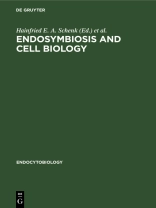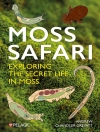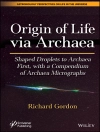Keine ausführliche Beschreibung für ‘Endosymbiosis and cell biology’ verfügbar.
Das E-Book Endosymbiosis and cell biology wird angeboten von De Gruyter und wurde mit folgenden Begriffen kategorisiert:
Cuprins
Frontmatter – PREFACE – WELCOME ADDRESS – CONTENTS – PART I. MORPHOLOGY AND PHYLOGENY OF PROKARYOTES, PROTISTS AND UNICELLULAR ALGAE – An improved method for labelling and sequencing T1-generated RNA-fragments – Macromolecule sequencing in phylogenetic studies: the phylogeny of spherical prokaryotes – Morphology and systematic position of some endocyanomes – Electrophoretic patterns of phycobiliproteins as taxonomic fingerprints of cyanobacteria (and endocyanelles?) – Morphology and phylogeny of flagellated protists – The imprints of ciliate phylogeny revealed by comparative freeze-fracture study of the ciliary membrane – Prokaryote evolution and the symbiotic origin of eukaryotes – PART II. MORPHOLOGICAL AND BIOCHEMICAL ADAPTION OF EUKARYOTES (ALGAE) IN INTER- AND INTRACELLULAR ENDOSYMBIOSIS – Glenodinium foliaceum: a dinof lagellate with an endosymbiont – Carbon metabolism of endosymbiotic algae – The regulation of the algal population size in Paramecium bursaria – Hypothesis: free maltose and cell surface sugars are signals in the infection of Paramecium bursaria by algae – Algal symabionts in larger foraminifera – Growth of the symbiont-bearing foraminifera Amphistegina lessonii d’Orbigny and Heterostegina depres’sa d’Orbiqnv (protozoa) – Symbionts in planktonic foraminifera (protozoa) – Ca deposition, re-mobilization and re-deposition in foraminifera and corals associated with algal endosymbionts (A) – A non essential role of the symbiotic zooxanthellae in the strobilation of Cassiopeia andromeda (scyphozoa, coelenterata) – An ecological view of specificity in algal-invertebrate associations with reference to the associations of Symbiodinium microadriaticum and coelenterates – Intraspecific variation in a zooxanthella – Release of photosynthetically-derived organic carbon from a hermatypic coral, Acropora cf. acuminata – Correlation of the ultrastructure of the cells of solid corals and their symbionts depending on light – Transmission of the algal and bacterial symbionts of green hydra through the host sexual cycle – Phagocytic recognition and the establishment of the Hydra viridis – Chlorella symbiosis – Regulation in the green hydra symbiosis – Sulfur metabolism in the green hydra symbiosis: the incorporation of sulfate-sulfur by symbiotic and aposymbiotic Hydra viridis – Transfer of photosynthate in green hydra – Symbionts involved in phosphate uptake by green hydra – Nutrient competition as a basis for symbiont selection in associations involving Convoluta roscoffensis and Amphiscolops langerhansi – Acquisition of algae by Convoluta roscoffensis – Symbiotic relationships between fungus and alga in basidiolichens – PART III. MORPHOLOGICAL AND BIOCHEMICAL ADAPTION OF PROKARYOTES (BACTERIA, CYANOBACTERIA) IN ENDOCYTOBIOSIS – Euglena gracilis – an eukaryote containing prokaryote type superoxide dismutase and unconjugated pteridines – The hydrogenosome, an H2-producing organelle of anaerobic flagellate protozoa2 – Modulation of polyamine level and biosynthetic enzymes by bacterial endosymbiontes in trypanosomatid protozoa – Effect of a bacterial symbiont on cell division in a ciliate – Aspect of ‘bacteria-ciliates’ symbiosis in the rumen: postulated role of the bacteria in the digestive system of the ciliate – Nucleus-specific symbionts in Paramecium caudatum – Omikron, an essential endosymbiont of Euplotes aediculatus – DNA of omikron – R bodies in Pseudomonas – Electron microscopy of lice symbionts – Ultrastructural data on pseudococcid endosymbionts (homoptera, coccoidea) – Investigations of the light microscopical and ultrastructure of the demeton-S-methyl resistance aphids under consideration of the mycetome symbionts of the Phorodon humuli Sch – Elimination of symbionts of tsetse flies (Glossina M. morsitans W.) by help of specific antibodies – Symbiont-dependent arrhenotokous parthenogenesis in the eukaryotic Xyleborus – Luminescent bacterial endosymbionts in biolum












